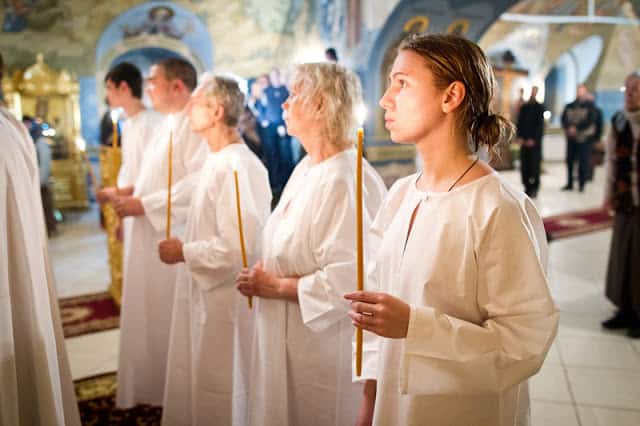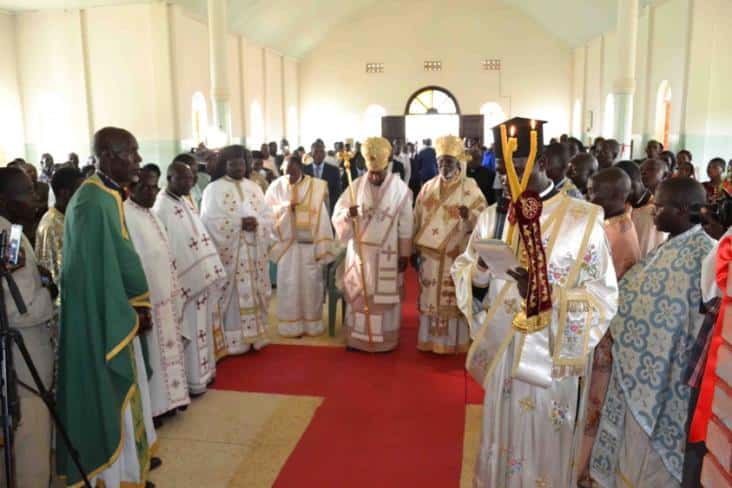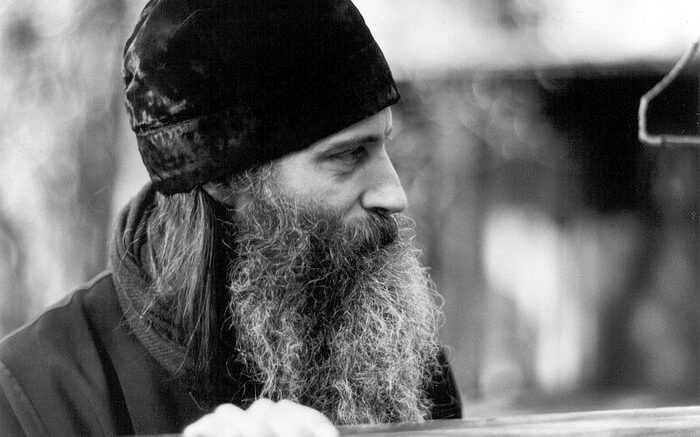
Traditionally, since the rise of the modern era, that is, roughly from the 1500s onwards, Orthodoxy has been an ethnic-centred faith; linked to specific ethnic communities that have perpetuated their identity basically through their participation in Orthodoxy as a means of social and cultural cohesiveness. In these type of communities – e.g., the Greek, the Serbian, the Russian – one would be born within the ethnic community and automatically, so to speak, be Orthodox!
Nowadays of course, people are sensitive to issues pertaining to religious freedom and open to so many religious, para-religious or quasi-religious influences that they don’t have to remain within the traditionally prescribed flock.
In other words, although one gets to be born Orthodox, one can now easily choose to uphold or reject Orthodoxy. On the other hand, there is always an easy way to go about the whole matter, namely, to let things be the way they are and just go with the flow of previous generations – and simply be a cultural Orthodox. So, there seem to be three contemporary options with regards to Orthodoxy: to be born and consciously choose to be Orthodox; to be born and just remain Orthodox; and to be born and consciously reject being Orthodox. Most Orthodox belong to the middle type – the easy one – since the other two involve too much effort and determination. But there is one more factor that comes into the picture and makes a huge difference: converts!
The Problem with Non-Converts
Non-converts, that is, people like me who have been born into the Orthodox faith, present a number of challenges and problems to Orthodoxy. It sounds like a paradox, but that’s how things are: it is the Orthodox that are the problem of Orthodoxy! More specifically, those that consciously reject being Orthodox end up demonising Orthodoxy by blaming all personal and social ills on the Orthodox Church. In this way they become a constant liability for Orthodoxy – bad publicity which is not the publicity that Orthodoxy needs…
Moreover, those who consciously choose to be Orthodox, although they might give the impression of keeping things alive – and, to an extent, they do so – in fact they just keep things going, without the thrust needed to reinvent ways through which the faith could be a revolutionary, innovative and creative force within the public domain. It’s as if they are so much absorbed by and obsessed with the duty to ‘save’ the Orthodox tradition that they unwittingly turn everything into a lifeless museum of curiosities…
Lastly, those that just remain Orthodox are, theologically speaking, a scandal of immense proportions: on the one hand, they are counted as being part of the Church – something that is quite expedient many a time, as when we say for instance that 90% of Greece is Orthodox – while, on the other hand, they contribute nothing to the historical adventure of the Church. If we were to envision the latter as an athlete that competes in a race for the Kingdom of God, then the cultural Orthodox amongst the ‘faithful’ are definitely slowing down – and hence jeopardising – the whole process, to say the least.

A Good but Unlikely Solution
Times and mores have changed, though; so much so that the Orthodox Church cannot keep on observing practices that were introduced, accommodated and consolidated within the community of the faithful because the overall conditions allowed for it. I am referring to infant baptism, which for centuries did have a rationale behind it, as well as certain guarantees that secured both the functionality and the solemnity of the sacrament. However, it has none of this backup anymore. Infant baptism, once a practice that could secure great numbers of membership to the Church through a reasonable means of spiritual management, if I may use such an expression, has now become a ceremony that only exacerbates the problem by adding more and more problematic members to the Church.
By deciding to go back to adult baptism – as the main practice – the Church could manage much better the quality of its membership. I know, this sort of discourse sounds rather managerial, but if we want to be honest, we must accept that there can be no proper inclusion without exclusion; no openness to all without the responsibility of the few – those who will take the leap of faith… Notwithstanding the above, I do not think that the conditions are ready in the Orthodox Church for such a decision, mainly because in each Orthodox ethnic community the cultural identification with the faith is mediated predominantly through the sacraments. Thus, the latter, and in our case baptism, would be the last thing that could possibly change. So, there must be another way for the renaissance of the Orthodox Church.
Whilst There Are Converts, There Is Hope
The Orthodox Church needs a revival; that much is a common secret. And from the looks of it – which I have attempted to outline through my thoughts thus far – this revival will not come from the inside, for there is no one there to act as a condition of possibility for its realisation. The only option is for someone and something to come from the outside and effect, slowly and gradually, the transformation of the inside. This, I believe, is what we witness in the case of converts and the experiences and aspirations they bring with them.

Converts to Orthodoxy are an incredibly dynamic global phenomenon. Throughout Africa Orthodoxy is living nothing less than a miracle with the faithful being counted now in the millions; South America is also another rapidly growing conversion site for global Orthodoxy; Asia may not be as impressive, but the pace there is quite consistent and very promising; and, finally, in the so-called ‘West’ the non-Orthodox who choose to enter the Orthodox Church have already made their presence felt. All this is an input that brings with it something that is out of the Orthodox cultural box, something that the Spirit has started turning into a new ‘wineskin’, fitting for the wine of the Gospel that always remains new…
Converts enter the Church with enthusiasm, determination and willingness. They come without the negative load and package that history has put on the shoulders of ethnic Orthodox peoples. By no means am I implying that conversion as a large-scale phenomenon comes without problems of its own, but what I am saying is that it brings into the life of the Church a multitude of elements – linguistic, anthropological, social, cultural, conceptual and even religious – that can only serve one purpose in the hands of the Living God: the enrichment and adornment of the Body of Christ.
Ethno-Orthodoxy is not just a problem when it turns out to be an out-of-control and full-scale expression of ethnophyletism; it is also a more everyday and insidious problem that imperceptibly chokes the Church. Orthodoxy needs to break the confines of its ethnic parochialism and proclaim the Gospel in the ecumenical, comprehensive and inclusive way that does justice to its tradition and respects the priority of the future Kingdom of God.

Converts might not be the panacea, but they certainly are our way out of the Egyptian bondage and the Babylonian exile that we have inflicted upon the Church by investing more and more on our cultural sensitivities and preferences instead of hallowing the Name of God.
ABOUT | INSIGHTS INTO GLOBAL ORTHODOXY with Dr Vassilis Adrahtas
"Insights into Global Orthodoxy" is a weekly column that features opinion articles that on the one hand capture the pulse of global Orthodoxy from the perspective of local sensitivities, needs and/or limitations, and on the other hand delve into the local pragmatics and significance of Orthodoxy in light of global trends and prerogatives.
Dr Vassilis Adrahtas holds a PhD in Studies in Religion (USyd) and a PhD in the Sociology of Religion (Panteion). He has taught at several universities in Australia and overseas. Since 2015 he has been teaching ancient Greek Religion and Myth at the University of New South Wales and Islamic Studies at Western Sydney University. He has published ten books. He has extensive experience in the print media as editor-in-chief, and columnist, and for a while he worked as a radio producer. He lives in Sydney, Australia, his birthplace.
Stay updated with the latest news from Greece and around the world on greekcitytimes.com.
Contact our newsroom to share your updates, stories, photos, or videos. Follow GCT on Google News and Apple News.


